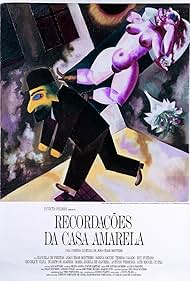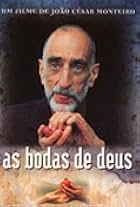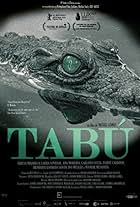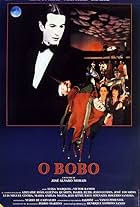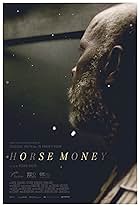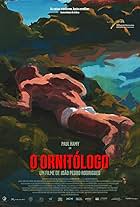IMDb RATING
7.3/10
1.5K
YOUR RATING
Lisbon, 1989. A middle-aged poor idiot, tormented by an illness, lives in a cheap room in a family boarding house, in the old section of the city's waterfront.Lisbon, 1989. A middle-aged poor idiot, tormented by an illness, lives in a cheap room in a family boarding house, in the old section of the city's waterfront.Lisbon, 1989. A middle-aged poor idiot, tormented by an illness, lives in a cheap room in a family boarding house, in the old section of the city's waterfront.
- Awards
- 2 wins & 2 nominations
Photos
Inês de Medeiros
- Mimi's Voice
- (voice)
Maria Ester Caldeira
- Neighbor
- (as Dona Ester Caldeira)
- Director
- Writer
- All cast & crew
- Production, box office & more at IMDbPro
Storyline
Did you know
- ConnectionsFollowed by God's Comedy (1995)
Featured review
Joao de Deus, broke down spindly intellectual, lives in the yellow house in Lisbon, a fussy boarding house for various of life's unattached. His touchstone is Erich von Stroheim, lady's man, chevalier, cineaste. He is also a Quixotic sensualist, and when frustrated in his attempts, an assaulter of women. He aspires towards a certain divinity, inspired to action by enabled figures such as Beethoven, von Stroheim, and Empedokles (via Hölderlin). This divinity exists, not so much in the eyes of others (although there are occasional flutterings of recognition), but in his own view and strivings. Reality is a big obstacle here, hard to pretend to be a god when you have to wait in line to use the bathroom. It is at these times that Joao has a certain elan, as if he is generously willing to overlook life's indignities.
Empedoklites were the followers of Empedokles, proclaiming one's own divinity can inspire followers, and maybe Monteiro makes a play for followers here. Life is somewhat of an embarrassment, why are we constantly needing to be ashamed of our instincts, who endowed Joao with the senses and appetites to make him lust after almost entirely uninterested women thirty years his junior. What is it to be a god other than to do as one's passions dictate?
It's important to be clear that sexually assaulting women is a nauseating and objectively wrong activity (consent violations are violations of objective morality). An educated individual can nonetheless take some vicarious enjoyment in Monteiro's staged displays of narcissism, and indeed the opening of the film is a mosquito tone designed to repel a different type of audience to the lobby. The film contains other provocations, designed to test the intimacy which our familiarity with his medical complaints has established, but also various sublime moments: various scenes suggest that classical music is our access to the divine; sat here, quite by chance listening to Beethoven's Pastoral Symphony on a shuffle, I find it impossible to disagree.
Joao's watery-eyed dignity asks of God the eternal "why?" question, immortalised by Blake in his painting of 1795, "Elohim Creating Adam". Whether this feeling of "J'accuse!" legitimises his behaviour and the blasphemy of the ending is a question for each viewer, it's certainly a very funny film that is far from unreasonable, I prefer it to the more famous brand of solipsism from Allen.
Empedoklites were the followers of Empedokles, proclaiming one's own divinity can inspire followers, and maybe Monteiro makes a play for followers here. Life is somewhat of an embarrassment, why are we constantly needing to be ashamed of our instincts, who endowed Joao with the senses and appetites to make him lust after almost entirely uninterested women thirty years his junior. What is it to be a god other than to do as one's passions dictate?
It's important to be clear that sexually assaulting women is a nauseating and objectively wrong activity (consent violations are violations of objective morality). An educated individual can nonetheless take some vicarious enjoyment in Monteiro's staged displays of narcissism, and indeed the opening of the film is a mosquito tone designed to repel a different type of audience to the lobby. The film contains other provocations, designed to test the intimacy which our familiarity with his medical complaints has established, but also various sublime moments: various scenes suggest that classical music is our access to the divine; sat here, quite by chance listening to Beethoven's Pastoral Symphony on a shuffle, I find it impossible to disagree.
Joao's watery-eyed dignity asks of God the eternal "why?" question, immortalised by Blake in his painting of 1795, "Elohim Creating Adam". Whether this feeling of "J'accuse!" legitimises his behaviour and the blasphemy of the ending is a question for each viewer, it's certainly a very funny film that is far from unreasonable, I prefer it to the more famous brand of solipsism from Allen.
- oOgiandujaOo_and_Eddy_Merckx
- Jul 18, 2022
- Permalink
Details
- Release date
- Country of origin
- Language
- Also known as
- Erinnerungen an das gelbe Haus
- Filming locations
- Production company
- See more company credits at IMDbPro
Box office
- Gross worldwide
- $1,382
- Runtime2 hours 2 minutes
- Color
- Aspect ratio
- 1.33 : 1
Contribute to this page
Suggest an edit or add missing content

Top Gap
By what name was Recollections of the Yellow House (1989) officially released in Canada in English?
Answer